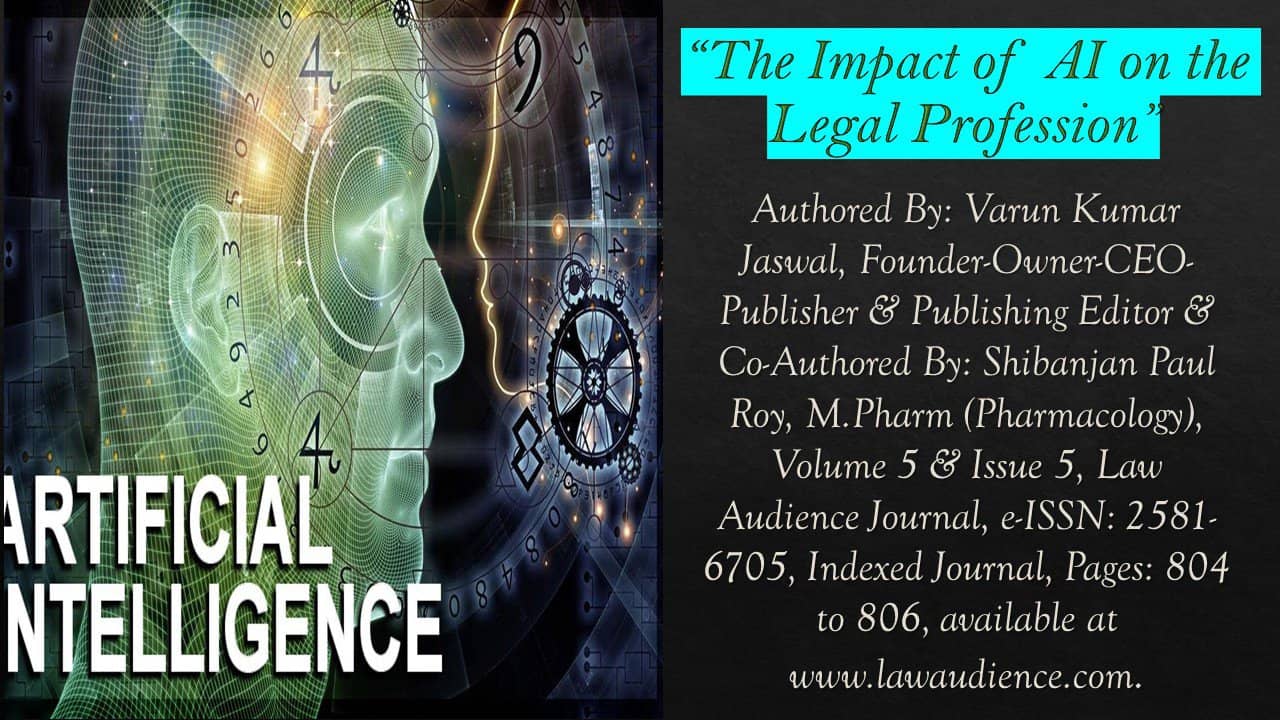Click here to download the full paper (PDF)
Authored By: Varun Kumar Jaswal, Founder-Owner-CEO-Publisher & Publishing Editor & Co-Authored By: Shibanjan Paul Roy, M.Pharm (Pharmacology),
Click here for Copyright Policy.
INTRODUCTION:
The integration of Artificial Intelligence (AI) into various sectors has been a transformative force, and the legal profession is no exception. AI technologies are reshaping the landscape of legal practice, enhancing efficiency, accuracy, and accessibility. This paper explores the multifaceted impact of AI on the legal profession, examining both the benefits and challenges it brings.
- AI IN LEGAL RESEARCH AND DOCUMENT REVIEW:
AI has significantly streamlined legal research and document review processes. Traditional legal research, which involves sifting through vast volumes of case law, statutes, and legal precedents, is time-consuming and labour-intensive. AI-powered legal research tools, such as Westlaw Edge and LexisNexis, utilize natural language processing (NLP) and machine learning algorithms to quickly and accurately retrieve relevant information. These tools can analyze and summarize case law, predict legal outcomes, and even suggest relevant citations, saving lawyers substantial time and effort.
Document review, a crucial aspect of legal practice, particularly in litigation and due diligence, has also been revolutionized by AI. E-discovery tools like Relativity and Ever law use AI to identify and categorize relevant documents from large datasets, significantly reducing the manual workload and increasing accuracy. AI’s ability to detect patterns and anomalies in documents enhances the quality of review and minimizes the risk of human error.
- PREDICTIVE ANALYTICS AND DECISION MAKING:
Predictive analytics is another area where AI is making significant inroads. AI algorithms can analyze historical legal data to predict the outcomes of cases, assess the strengths and weaknesses of legal arguments, and estimate the potential costs and duration of litigation. Tools like Premonition and Lex Machina provide data-driven insights that help lawyers formulate strategies and make informed decisions. This predictive capability not only enhances the efficiency of legal practice but also improves client service by providing more accurate risk assessments and outcome predictions.
- CONTRACT ANALYSIS AND MANAGEMENT:
AI is transforming contract analysis and management through tools like Kira Systems and LawGeex. These AI-powered platforms can review and analyze contracts at a speed and accuracy level that surpasses human capabilities. They can identify key clauses, detect inconsistencies, and ensure compliance with regulatory requirements. AI also facilitates the automation of routine contract management tasks, such as drafting, reviewing, and updating contracts, freeing up legal professionals to focus on more complex and strategic activities.
- LEGAL CHATBOTS AND CLIENT INTERACTION:
AI-powered chatbots are increasingly being used to enhance client interaction and service delivery. Legal chatbots, such as DoNotPay and Ailira, can provide legal information, answer common legal questions, and assist with basic legal tasks like generating documents or filing claims. These chatbots operate 24/7, offering clients immediate access to legal assistance and improving the overall accessibility of legal services. For law firms, chatbots can handle routine inquiries and administrative tasks, allowing lawyers to focus on more substantive work.
- ETHICAL AND PROFESSIONAL CONSIDERATIONS:
While AI offers numerous benefits, its integration into the legal profession raises several ethical and professional considerations. One primary concern is the potential for bias in AI algorithms. If the data used to train AI systems reflects historical biases, the AI may perpetuate or even amplify these biases in its recommendations and decisions. Ensuring the fairness and transparency of AI systems is critical to maintaining justice and equality in legal practice. Another concern is the impact of AI on employment within the legal profession. As AI automates routine and repetitive tasks, there is a risk of job displacement for paralegals, junior associates, and other legal support staff. However, AI also creates opportunities for legal professionals to engage in more complex and high-value work, potentially leading to a shift in the types of skills and expertise that are in demand.
CONCLUSION:
AI is undeniably transforming the legal profession, offering significant benefits in terms of efficiency, accuracy, and accessibility. From legal research and document review to predictive analytics, contract management, and client interaction, AI is reshaping how legal services are delivered. However, the integration of AI also brings challenges that must be addressed, particularly regarding ethical considerations and the potential impact on employment. As the legal profession continues to evolve with AI, it is essential for legal professionals to adapt and embrace these changes while ensuring that the core values of justice and fairness are upheld.
Cite this article as:
Varun Kumar Jaswal & Shibanjan Paul Roy , “The Impact of AI on the Legal Profession”, Vol.5 & Issue 5, Law Audience Journal (e-ISSN: 2581-6705), Pages 804 to 806 (13th July 2024), available at https://www.lawaudience.com/case-comment-on-madras-bar-association-vs-union-of-india-anr-a-i-r-2015-s-c-1571.


